AB InBev (Anheuser-Busch InBev) is a global brewing giant that has grown significantly through a series of mergers and acquisitions. Here’s a brief overview of the company’s most notable acquisitions:
1. Interbrew (1987)
- Description: AB InBev’s story began with the formation of Interbrew in 1987, following the merger of two Belgian breweries, Artois (founded in 1366) and Piedboeuf. This set the stage for what would eventually become one of the largest brewing companies in the world.
2. AmBev (2004)
- Description: Interbrew merged with AmBev (Companhia de Bebidas das Américas), a leading Brazilian brewer, in 2004. This merger created InBev, a powerful brewing entity with a strong presence in both Europe and Latin America.
3. Anheuser-Busch (2008)
- Description: InBev acquired Anheuser-Busch, the American brewing giant known for brands like Budweiser, in 2008 for approximately $52 billion. This acquisition created Anheuser-Busch InBev (AB InBev) and made the company the world’s largest brewer by volume.
4. Grupo Modelo (2013)
- Description: AB InBev acquired Grupo Modelo, the Mexican brewer behind Corona, for $20.1 billion. This acquisition further expanded AB InBev’s portfolio and solidified its presence in Latin America.
5. SABMiller (2016)
- Description: In one of the largest mergers in corporate history, AB InBev acquired SABMiller for approximately $100 billion. SABMiller was the world’s second-largest brewer at the time, and this merger further cemented AB InBev’s dominance in the global beer market. As a part of the deal, AB InBev had to divest certain brands and assets, including the sale of SABMiller’s stake in MillerCoors to Molson Coors.
6. Oriental Brewery (2014)
- Description: AB InBev reacquired Oriental Brewery, South Korea’s leading brewer, for $5.8 billion. AB InBev had previously sold Oriental Brewery to KKR in 2009 but retained an option to repurchase it, which it exercised in 2014.
7. Craft Beer Acquisitions (2011-2017)
- Description: AB InBev has also been active in acquiring craft breweries to diversify its portfolio. Notable acquisitions include Goose Island (2011), Blue Point Brewing Company (2014), 10 Barrel Brewing Co. (2014), Elysian Brewing Company (2015), and Wicked Weed Brewing (2017). These acquisitions allowed AB InBev to tap into the growing craft beer market.
8. ZX Ventures (2015)
- Description: AB InBev launched ZX Ventures, its venture capital arm, in 2015. ZX Ventures focuses on investments in high-growth areas such as craft beer, e-commerce, and innovation. Through ZX Ventures, AB InBev has acquired stakes in various startups and brands, further expanding its reach and influence.
9. Beck’s Brewery (2001)
- Description: Before the major mergers, Interbrew (later AB InBev) acquired Beck’s Brewery, the German brewery known for Beck’s beer, in 2001. This acquisition helped expand its footprint in Europe and solidify its position in the premium beer segment.
10. Labatt Brewing Company (1995)
- Description: Interbrew acquired Labatt Brewing Company, one of Canada’s largest breweries, in 1995. This acquisition provided Interbrew with a strong foothold in the North American market and access to iconic Canadian brands like Labatt Blue.
AB InBev’s growth strategy has been heavily driven by mergers and acquisitions, allowing it to dominate the global beer market. The company’s most transformative acquisitions include the merger with AmBev, the acquisition of Anheuser-Busch, and the merger with SABMiller. These deals, along with numerous smaller acquisitions, have positioned AB InBev as a powerhouse in the global brewing industry.

